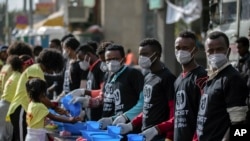Health experts in Ethiopia are raising concern, as some religious leaders continue to host large gatherings despite government orders not to do so in the wake of the coronavirus outbreak.
Earlier this week, Ethiopia’s government ordered security forces to enforce a ban on large gatherings aimed at preventing the spread of COVID-19.
Ethiopia has seen only 12 cases and no deaths from the virus, and authorities would like to keep it that way.
But enforcing the orders has proven difficult as religious groups continue to meet and, according to religious leaders, fail to treat the risks seriously.
Daniel Seifemichael Feleke, media director for the Ethiopian Orthodox Tewahedo Church, spoke to VOA by telephone.
“Basically it’s a lack of understanding. It is not a kind of resisting the regulations," said Feleke. "It is a lack of understanding towards this disaster. Some people do not understand or capture fully the sensitivity of the issue. That’s why we’ve seen some irregularities, but soon this will be corrected because we are also using our media and administrative channels to regulate this issue.”
Feleke also said that many people in Ethiopia are affected by misinformation and superstitious beliefs propagated through social media.
“There are also misconceptions due to social media," said Feleke. "People have different information, so now we are trying to do two things: one to propagate and distribute the correct information to the people and the other one is to protect the people from the wrong information. There is plenty of wrong information that is superstitious and irresponsible.”
Religious leaders throughout the country have come up with specific guidelines for churches and mosques on how to worship safely. The rules include keeping a distance of at least 1.5 meters between each individual.
Teshome Fikre, secretary general of Catholic Bishops Conference of Ethiopia, spoke via a messaging app.
“Church services are still continuing with a very few number of people," said Teshome. "We have created awareness and then there are ushers in the churches who are assigned places. In bigger crowd times we had six people sitting on one bench, but now we have two people sitting on one bench.”
Still, Teshome says he remains very worried about people flouting the rules.
“People are still feeling that nothing is happening and that worries us, that scares us," said Teshome. "The awareness which is given by the government on TV on radios on telephones on Facebook, people are not still aware how dangerous and how serious the cases of coronavirus are. You feel that people are just ignoring the fact that there is coronavirus. I think that ignorance and ignoring the truth is dangerous.”
Aware of such risks, the Africa Centers for Disease Control and Prevention is monitoring how governments are implementing bans on large gatherings.
The organization says that if people follow the rules, the number of cases on the continent should stay relatively low.




